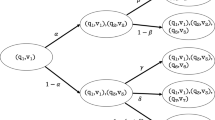Abstract
The author of “Evidence, Explanation, Enhanced Indispensability” advances a criticism to the Enhanced Indispensability Argument and the use of Inference to the Best Explanation in order to draw ontological conclusions from mathematical explanations in science. His argument relies on the availability of equivalent though competing explanations, and a pluralist stance on explanation. I discuss whether pluralism emerges as a stable position, and focus here on two main points: whether cases of equivalent explanations have been actually offered, and which ontological consequences should follow from these.
Similar content being viewed by others
Notes
I, like Molinini, distinguish between having the same explanatory power and having the same empirical adequacy. In what follows, I will use ‘equivalent explanations’ to mean ‘explanations with the same explanatory power’, and not merely to mean ‘empirically equivalent explanations’.
Field (1989, p. 18) distinguished between “intrinsic” and “extrinsic” explanations of physical phenomena. The former “don’t invoke entities that are causally irrelevant to what is being explained”, while the latter also appeal to some other (plausibly mathematical, causally irrelevant) objects. The first nominalist option mentioned in the text is tantamount to arguing that given a prima facie mathematical, i.e. extrinsic, explanation of a phenomenon e, there is (always, in Field’s view) an alternative intrinsic explanation to be preferred. The second option, on the other hand, is tantamount to claiming that independently of the availability of such an intrinsic explanation of e, the role played in the extrinsic explanation by mathematical theories and/or objects is not explanatory in character. The first option, if successful, is effective against most traditional formulations of indispensability arguments, and also against EIA on the proviso that EIA be based also on the syntactic or deductive indispensability of the relevant mathematical theories to the formulation of the explanation (a version of EIA based only on the fact that there are good mathematical explanations of e, even though other equally good explanations are available where the relevant mathematics is syntactically and deductively dispensable, may not be affected by this first nominalist option). The second option, if successful, is effective against EIA, but is not by itself effective against other versions of indispensability arguments based on the syntactic or deductive indispensability of the relevant mathematical theories for the explanation under consideration.
References
Andréka, H., Madarász, J. X., & Németi, I. (2002). On the logical structure of relativity theories. (E-book. Alfréd Rényi Institute of Mathematics, Budapest. With contributions from A. Andai, G. Sági, I. Sain, Cs. Tőke. http://www.math-inst.hu/pub/algebraic-logic/olsort.html).
Baker, A. (2003). The indispensability argument and multiple foundations for mathematics. Philosophical Quarterly, 53(210), 49–8211.
Baker, A. (2005). Are there genuine mathematical explanations of physical phenomena? Mind, 114(454), 223–238.
Balaguer, M. (1998). Platonism and anti-platonism in mathematics. Oxford: Oxford University Press.
Bangu, S. (2008). Inference to the best explanation and mathematical realism. Synthese, 160(1), 13–20.
Beall, J., & Restall, G. (2006). Logical pluralism (Vol. 78(4)). Oxford: Oxford University Press.
Benacerraf, P. (1965). What numbers could not be. Philosophical Review, 74(1), 47–73.
Field, H. (1989). Realism, mathematics and modality. Oxford: Blackwell.
Molinini, D. (2011). Towards a pluralist approach to mathematical explanation of physical phenomena. PhD Thesis, Université Paris VII. Published by ANRT (Lille)
Molinini, D. (2014). Evidence, explanation, and enhanced indispensability. In D. Molinini, F. Pataut, & A. Sereni (Eds.), Synthese, special issue Indispensability and Explanation. doi:10.1007/s11229-014-0494-2.
Paseau, A. (2007). Scientific platonism. In M. Leng, A. Paseau, & M. D. Potter (Eds.), Mathematical knowledge (pp. 123–149). Oxford: Oxford University Press.
Pedersen, N. J. L. L., and Wright, C. (2013). Pluralist theories of truth. In E. N. Zalta (Ed.), The stanford encyclopedia of philosophy (Spring 2013 Ed.). http://plato.stanford.edu/archives/spr2013/entries/truth-pluralist/.
Pincock, C. (2004). A revealing flaw in Colyvan’s indispensability argument. Philosophy of Science, 71(1), 61–79.
Putnam, H. (1967). Mathematics without foundations. Journal of Philosophy, 64(1), 5–22.
Russell, G. (2013). Logical pluralism. In E. N. Zalta (Ed.), The stanford encyclopedia of philosophy (Summer 2013 Ed.). http://plato.stanford.edu/archives/sum2013/entries/logical-pluralism/.
Wright, C. (1992). Truth and objectivity. Cambridge: Harvard University Press.
Author information
Authors and Affiliations
Corresponding author
Additional information
I wish to thank the organizer and audience of the workshop “Indispensability and Explanation” (Paris, IHPST, November 19–20, 2012). Special thanks go to Daniele Molinini for many helpful discussions and to two anonymous referees of this journal for their precious suggestions.
Rights and permissions
About this article
Cite this article
Sereni, A. Equivalent explanations and mathematical realism. Reply to “Evidence, Explanation, and Enhanced Indispensability”. Synthese 193, 423–434 (2016). https://doi.org/10.1007/s11229-014-0491-5
Received:
Accepted:
Published:
Issue Date:
DOI: https://doi.org/10.1007/s11229-014-0491-5



